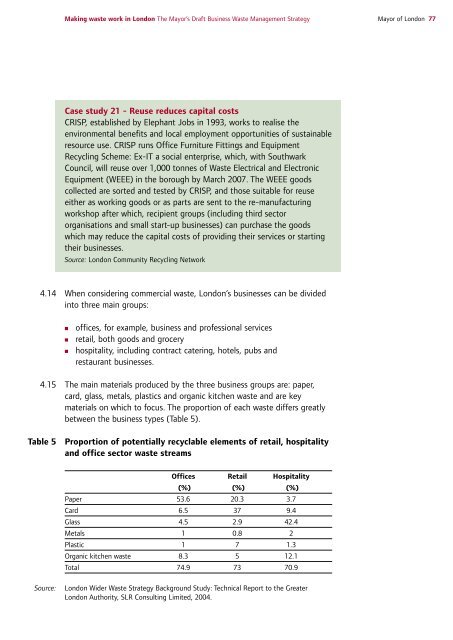Draft Business Waste Strategy PDF - london.gov.uk - Greater ...
Draft Business Waste Strategy PDF - london.gov.uk - Greater ...
Draft Business Waste Strategy PDF - london.gov.uk - Greater ...
You also want an ePaper? Increase the reach of your titles
YUMPU automatically turns print PDFs into web optimized ePapers that Google loves.
Making waste work in London The Mayor’s <strong>Draft</strong> <strong>Business</strong> <strong>Waste</strong> Management <strong>Strategy</strong> Mayor of London 77<br />
Case study 21 - Reuse reduces capital costs<br />
CRISP, established by Elephant Jobs in 1993, works to realise the<br />
environmental benefits and local employment opportunities of sustainable<br />
resource use. CRISP runs Office Furniture Fittings and Equipment<br />
Recycling Scheme: Ex-IT a social enterprise, which, with Southwark<br />
Council, will reuse over 1,000 tonnes of <strong>Waste</strong> Electrical and Electronic<br />
Equipment (WEEE) in the borough by March 2007. The WEEE goods<br />
collected are sorted and tested by CRISP, and those suitable for reuse<br />
either as working goods or as parts are sent to the re-manufacturing<br />
workshop after which, recipient groups (including third sector<br />
organisations and small start-up businesses) can purchase the goods<br />
which may reduce the capital costs of providing their services or starting<br />
their businesses.<br />
Source: London Community Recycling Network<br />
4.14 When considering commercial waste, London’s businesses can be divided<br />
into three main groups:<br />
■ offices, for example, business and professional services<br />
■ retail, both goods and grocery<br />
■ hospitality, including contract catering, hotels, pubs and<br />
restaurant businesses.<br />
4.15 The main materials produced by the three business groups are: paper,<br />
card, glass, metals, plastics and organic kitchen waste and are key<br />
materials on which to focus. The proportion of each waste differs greatly<br />
between the business types (Table 5).<br />
Table 5 Proportion of potentially recyclable elements of retail, hospitality<br />
and office sector waste streams<br />
Offices Retail Hospitality<br />
(%) (%) (%)<br />
Paper 53.6 20.3 3.7<br />
Card 6.5 37 9.4<br />
Glass 4.5 2.9 42.4<br />
Metals 1 0.8 2<br />
Plastic 1 7 1.3<br />
Organic kitchen waste 8.3 5 12.1<br />
Total 74.9 73 70.9<br />
Source: London Wider <strong>Waste</strong> <strong>Strategy</strong> Background Study: Technical Report to the <strong>Greater</strong><br />
London Authority, SLR Consulting Limited, 2004.
















